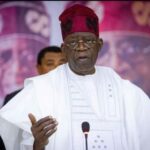
Retired Super Eagles midfielder and Atlanta 1996 Olympic Games gold medalist Garba Lawal talks about his time with the national team, winning gold at the Olympics and more, in this interview with ‘TANA AIYEJINA
How interesting was your football career?
Julius Berger signed me as a teenager in 1991 with the likes of Monday and Austin Eguavoen, Godwin Kanu, Edema Fuludu, Taribo West, Ayo Ogunlana, Kabiru Mohammed, and others. I played in Berger for three seasons and then after the 1993/94 season, I moved to Esperance of Tunis as a teenager too. At that time, they had 10 players in the Tunisian national team, I was the only foreigner there. Then, their national team coach was Henryk Kasperczak from Poland. Playing in Esperance from November 1994 to 1996 after the Olympics was a great experience. Winning the Olympics was the defining moment, and afterwards I proceeded to Roda JC in Holland, where I played for seven years. I enjoyed playing football there, because if you are in Holland, and you don’t know how to play football, I don’t think you can learn football anywhere. That place was like the home of learning football. If you watch most English teams, a lot of coaches from Holland coach their U-19s and U-20s. It’s been a good experience playing in Holland and then coming into the national team to play with the likes of Austin Okocha, Finidi George, Daniel Amokachi, Taribo West, Uche Okechukwu, Celestine Babayaro, Tijani Babangida, Victor Ikpeba, Mutiu Adepoju, Nwankwo Kanu was quite interesting. After that there was Julius Aghahowa, Joseph Yobo, Yakubu Aiyegbeni, John Utaka and Ifeanyi Udeze, these are the young players that came after us, it was great playing in the green shirt.
What’s the difference between the Eagles of your time and the current team?
That time, there was so much competition in every department, four, five players each, so that is why when I see the way our national teams are playing now, for me, there is no competition at the moment. That is why you see us struggling, because they know if they play badly today, they will retain their positions tomorrow. But in our time, when you fumbled, you won’t play the next game, you will beg to have another chance to come in, and the discipline also must go in line with the coaches’ methodology. That is why a lot of people complained then of how I always got into the national team; but it’s the coach’s philosophy, it’s not me. People kept asking why every coach that came never placed me on the bench, and I told them to ask the coach, not me. When you have a player that can play in more than three positions as a coach, you have confidence in him. If you are versatile, the coach will call on you anytime there’s a problem and then you go in and change the game. I remember at the 1996 Olympics, I had never trained as a left-back. But in the group game against Brazil, which we lost 1-0, the coach told me to warm up. I asked him what position I was going to play and he said ‘left-back.’ I said, ‘No problem’ because I had no choice. I also remember that Sunday Oliseh got a red card in the game before that match, so, he was suspended against Brazil. He had already told me that in the next game I was going to play defensively and I said, ‘No problem’. He said just ‘try and play it, it is not your position’. That time, whether you said yes or no, you must play. So, I had no option. Sometimes, I played left-back, sometimes I played No.7 in attack, and sometimes I play as a holding midfielder, anywhere we had problems. So, there was no way I would have been dropped from the team, but people don’t understand that it is not me that will tell the coach I am versatile. It is the coach that will decide, he knows better than the players, that is why he is there as the coach.
There were media reports then that there was a mafia in the national team that dictated to the coach which player to invite to camp. So, the mafia couldn’t stop you from being selected by the coaches?
The people that said it, were they in the Super Eagles camp? If you want to know, go and speak with the players. I grew up with Babangida, with Babayaro. We played games in boys competitions. I know Amokachi since 1981, so we have come a long way and we met in the national team. So, when you see us moving together, we are not mafia in camp, it is because we already knew ourselves from childhood. So, people just like to talk, whatever you do, people must talk.
One of the Eagles’ biggest wins at the World Cup was beating Spain 3-2 in 1998 in France, but they lost to Denmark 4-1. What went wrong?
I have never seen a team like that 1998 team because even the world rated Spain as one of the favourites to win the tournament but we beat them. The game against Denmark, however, we went in with too much confidence, we were thinking they couldn’t stop us because we already beat Spain. But everything changed in the early minutes, we were already two goals down.
Do you think we can have a team like that of your time?
It is going to be difficult, even global football is changing now. It is not like before, European football is not like 20 years ago but they are much better than us anyway.
What do you think can be done to get us back to global limelight?
I have no idea, I am lost, maybe this generation of our footballers are playing like this because of the internet and social media. During our time, we didn’t have social media, so maybe thats what’s happening now.
At the Atlanta 1996 Olympic Games, the U-23 team won the gold after beating Argentina 3-2 in the final. What was going through your mind during the dying minutes of the final game?
Nothing, it was to be or not to be. We knew what we could do, and if we could beat Brazil after three goals down, we could beat Argentina, there was no room for complacency.
When the gold medal was being placed on your neck, how did you feel at that moment?
We were thinking we were the first African team here and we were Olympic champions because nobody gave us a chance in Nigeria.
Is it true preparations ahead of the Olympics was very poor, with the players having to wash their in jerseys themselves in their hotel?
Yes, but that was largely affected by money, not the preparation. We trained well, it was just the money that time. Nobody had a penny then in the US, so, we had to wash our dirty kits, then we spread them outside. There was a time the hotel staff said ‘we don’t want to see African clothes outside here. if you wash, you have to spread them in your bathroom.’ And we said, ‘it’s okay, we are sorry.’
In your years playing for both club and country, when will you say was your best moment as a footballer?
The best moment I will always remember is when our team won the Olympics, then playing at the World Cup, then the Nations Cup, those are the great moments. I was at the World Cup twice, and I was part of the Nations Cup four times, and the Olympics, so, I am lucky to be part of these great tournaments, those are the moments every player wants.
When was your worst moment?
No, I have none, football is all about ups and downs, whether you like it or not, you can’t be playing good games until you finish career. That is impossible as a human being, sometimes you play bad games, it is normal.




